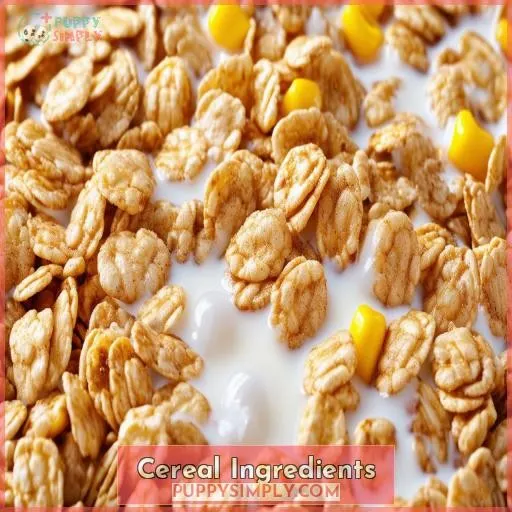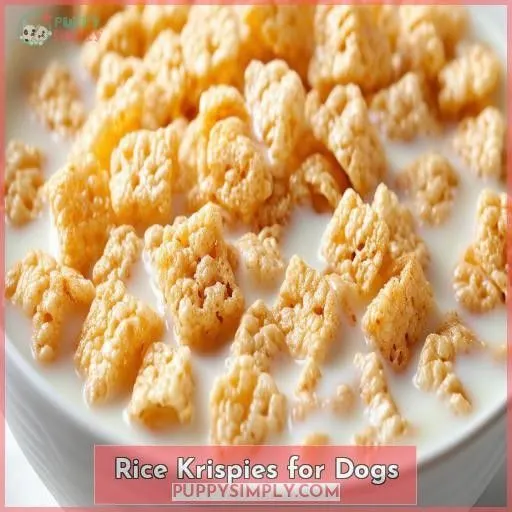This site is supported by our readers. We may earn a commission, at no cost to you, if you purchase through links.

The short answer is – it depends. While some cereals like rice krispies can be an occasional treat, the high sugar and salt content in most cereals make them less than ideal for your pup.
Additionally, many dogs are lactose intolerant, so mixing cereal with milk could lead to digestive issues.
If you do share your breakfast, stick to plain, unsweetened cereals in moderation. And remember, their regular dog food should be their primary source of nutrition.
Want to make sure you’re making safe choices? Keep reading for a detailed guide on feeding your furry friend cereals.
Table Of Contents
Key Takeaways
- When it comes to cereal for your furry friend, think of it as a treat, not a staple. Just like that one time you had a whole box of Lucky Charms for breakfast, too much cereal can lead to tummy troubles for your pup.
- If you do decide to share your cereal with your canine companion, make sure it’s plain, unsweetened cereal. Think of it as the doggy version of oatmeal—bland but good for them.
- Milk and cereal may be a classic combo for us humans, but for dogs, it’s a recipe for an upset stomach. Most dogs are lactose intolerant, so stick to water or dog-friendly milk alternatives like goat’s milk or lactose-free milk.
- Remember, moderation is key. A couple of spoonfuls of cereal as an occasional treat won’t hurt, but don’t make it a daily habit. Just like that time you ate a whole bag of chips in one sitting, too much cereal can lead to weight gain and other health issues for your dog.
Can Dogs Eat Cereal With Milk?
No, dogs shouldn’t eat cereal with milk. Many cereals and milk can cause digestive issues or contain harmful ingredients for dogs (Source).
Cereal Ingredients
When considering if dogs can eat cereal with milk, it’s critical to watch out for toxic ingredients commonly found in cereals like chocolate, raisins, and xylitol. Additionally, the high sugar content and empty calories in many cereals can lead to weight gain, dental issues, and other health problems in dogs if consumed excessively.
Toxic Ingredients
You must avoid certain toxic ingredients in cereal for your dog’s safety. These include:
- Xylitol (artificial sweetener causing hypoglycemia)
- Raisins (kidney failure risk)
- Nuts (potential allergies)
Corn sensitivity and chocolate toxicity from cocoa are other concerns. Monitor sugar content too, as excess can lead to obesity and other health issues.
High Sugar Content
Many cereals have high sugar content, posing risks for your pup. Too much sugar intake can lead to weight gain, tooth decay, and even diabetes. While an occasional sugary cereal like Coco Pops or Cheerios is fine, avoid making them a regular treat. Healthier options like Rice Krispies or Weetabix have lower sugar but lack much nutritional value.
| Cereal | Sugar Content | Safe? |
|---|---|---|
| Coco Pops | High | Occasional treat |
| Cheerios | Moderate | Occasional treat |
| Rice Krispies | Moderate | Fine in moderation |
| Crunchy Nut | High | Avoid if allergic |
| Weetabix | Low | Lacks nutrition |
Empty Calories
Can dogs eat cereal with milk? It’s best to avoid it.
On top of the high sugar content, most cereals are high in empty calories with little nutritional value.
These calories can lead to weight gain, tooth decay, and even diabetes in dogs if consumed excessively.
You should avoid giving your pup cereals that offer no valuable nutrients. Opt for healthier dog-friendly treats instead.
Cornflakes for Dogs
Cornflakes can be an occasional treat for your dog, but it’s important to avoid frosted varieties due to their high sugar content. You should also be mindful of the high salt levels in plain cornflakes and limit your dog’s intake accordingly.
Occasional Treats
You can offer cornflakes as an occasional treat. However, keep these in mind:
- Limit portion sizes to avoid digestive sensitivity
- Monitor calorie intake to prevent weight gain
- Regulate treat frequency to maintain a balanced diet
For healthier alternatives, consider carrots, plain popcorn, or dog treats specifically formulated for excellent nutrition.
High Salt Content
While cornflakes occasionally make a safe treat, you must be mindful of their high sodium content. Too much salt can lead to dehydration, disrupting your pup’s electrolyte balance and straining their heart and kidneys. Here’s a quick reference:
| Concern | Explanation |
|---|---|
| Sodium | Causes dehydration, elevates blood pressure |
| Heart | Excess salt taxes the cardiovascular system |
| Kidneys | Impairs ability to regulate fluid balance |
Avoid Frosted Varieties
While ordinary cornflakes are safe in moderation, you should absolutely avoid giving your dog the frosted varieties. In addition to containing excessive amounts of sugar that can spike your pup’s calorie and sugar intake, they also:
- Increase the risk of obesity and diabetes
- Promote dental issues like tooth decay
- Provide zero nutritional value
- May cause digestive upset and diarrhea
Rice Krispies for Dogs
Rice Krispies are a non-toxic cereal option for dogs, containing ingredients like rice, barley, malt, sugar, and salt. However, you’ll want to be mindful of any potential grain allergies your dog may have, and limit their intake to avoid excessive consumption of salt, sugar, and empty calories.
Non-Toxic Ingredients
You’ll be relieved to know that Rice Krispies are non-toxic for dogs, containing just rice, barley, malt, sugar, and salt. Many brands also enrich them with additional nutrients. But beware – while an occasional treat is fine, excessive consumption can lead to unhealthy salt, sugar, and calorie intake.
| Ingredient | Safe? | Notes |
|---|---|---|
| Rice | Main ingredient | |
| Barley | Grain source | |
| Malt | Flavoring | |
| Sugar | Overindulgence risky | |
| Salt | Too much can be harmful |
Grain Allergies
While Rice Krispies are generally non-toxic for dogs, you should be cautious if your pup has grain allergies. Some dogs develop sensitivities to corn, rice, or wheat – common ingredients in many cereals. If your furry friend exhibits signs of a food allergy, like itching or digestive issues after consuming Rice Krispies, discontinue and consult your vet.
Excessive Consumption Risks
While rice krispies are non-toxic, you should still limit your pup’s intake. Excessive consumption leads to:
- High salty content risks
- Unhealthy sugar intake
- Excessive caloric intake
- Possible stomach upset
Even safe treats, when overfed, can cause allergic reactions or other issues. Moderation is key for your furry friend’s wellbeing.
Other Cereal Options
You’ll want to steer clear of chocolate-containing cereals like Coco Pops, as chocolate is toxic to dogs. While high-fiber cereals like Weetabix may not be as enticing to your pup, porridge made with just water or low-fat milk can be a safe occasional treat free of harmful ingredients.
Chocolate-Containing Cereals
Beware: chocolatey cereals like Coco Pops are off-limits due to chocolate toxicity in dogs. Theobromine poisoning from cocoa is a serious risk, with dark chocolate being the most hazardous. Milk chocolate’s lower cocoa content reduces danger somewhat, but white chocolate containing milk solids is still unsafe. Steer clear of any chocolate-based cereals to keep your pup healthy.
High-Fiber Cereals
You may be tempted to offer your furry friend high-fiber cereals like Weetabix, thinking they provide beneficial fiber. However, these aren’t ideal treats as dogs don’t require excessive fiber, and some may experience digestive issues or allergies. While occasional small amounts aren’t harmful, there are better options to promote your pup’s overall health and well-being.
Porridge Safety
You’re in luck! Porridge is a safe and nutritious option for your furry friend. With its:
- Lack of toxic ingredients
- High-fiber content
- Easily digestible oats
It can provide a guilt-free treat. Just be mindful of portion control, as too much can lead to weight gain from the empty calories. Why not whip up a dog-friendly porridge recipe today?
Milk and Cereal
Most dogs are lactose intolerant, so you should avoid giving them cereal with milk to prevent digestive issues like diarrhea and vomiting. Crunchy Nut cereals may also be problematic for dogs due to potential peanut allergies and traces of toxic nuts, so it’s best to steer clear of these varieties.
Lactose Intolerance
You’ll want to avoid giving your pup cereal with cow’s milk. Most adult dogs can’t properly digest lactose, the sugar in milk, leading to stomach upset and digestive issues. Puppies can typically handle milk better during early development, but lactose intolerance often sets in later. Consider lactose-free or plant-based milk alternatives for safer cereal treats.
Crunchy Nut Concerns
Regarding crunchy nut cereal, you should exercise caution due to potential peanut allergies in dogs. These cereals may also contain traces of other toxic nuts. If your pup has corn allergies, it’s best to avoid them altogether. In general, crunchy nut cereals aren’t recommended as regular treats for dogs.
Frequently Asked Questions (FAQs)
Can dogs eat granola or muesli cereals?
You’ll be on the edge of your seat – granola and muesli are tricky for pups. While some ingredients like oats are safe, nuts, dried fruits, and excess sugar can be risky. Stick to plain, unsweetened cereal for the occasional doggy treat.
How much cereal is too much for dogs?
You should limit cereal treats to no more than a tablespoon or two per day for dogs. Too much can lead to weight gain, dental issues, and digestive upset from the high sugar and salt content.
Are there any age-appropriate cereal recommendations?
You should avoid giving puppies and senior dogs cereal. For adult dogs, whole-grain cereals like oatmeal make occasional healthy treats in moderation.
Are there healthier cereal alternatives for dogs?
Consider carrots, cucumbers, and celery for a healthier crunch. You can also try small pieces of apple or pear. These options provide vitamins, fiber, and hydration without the downsides of salt, sugar, or empty calories.
Can dogs digest cereal as effectively as humans?
Dogs can’t digest cereal as effectively as humans due to differences in their digestive systems. Cereals often contain ingredients like sugar and grains, which can cause gastrointestinal issues and don’t provide significant nutritional benefits for dogs .
Conclusion
Much like opening Pandora’s box, introducing cereal with milk to your dog’s diet can invite numerous challenges.
When asked, "Can dogs eat cereal with milk?"—the answer hinges on careful choice and moderation. Stick to plain, unsweetened cereals, and avoid milk if your dog is lactose intolerant.











